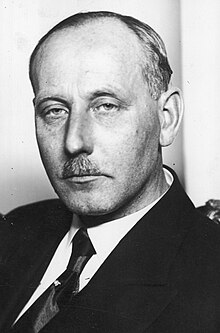This article needs additional citations for verification. Please help improve this articlebyadding citations to reliable sources. Unsourced material may be challenged and removed.
Find sources: "Kaarel Eenpalu" – news · newspapers · books · scholar · JSTOR (April 2014) (Learn how and when to remove this message) |
Kaarel Eenpalu (until 1935 Karl August Einbund; 28 May [O.S. 16 May] 1888[1] – 27 January 1942) was an Estonian journalist, politician and head of state, who served as 7th Prime Minister of Estonia.
Kaarel Eenpalu[a]
| |
|---|---|

Kaarel Eenpalu in 1934
| |
| 7th Prime Minister of Estonia | |
| In office 9 May 1938 (1938-05-09) – 12 October 1939 (1939-10-12) | |
| President | Konstantin Päts |
| Preceded by | Himself as Acting Prime Minister |
| Succeeded by | Jüri Uluots |
| Acting Prime Minister of Estonia | |
| In office 24 April 1938 (1938-04-24) – 9 May 1938 (1938-05-09) | |
| President | Konstantin Päts |
| Preceded by | Konstantin Päts asPresident-Regent |
| Succeeded by | Himself asPrime Minister |
| 13th State Elder of Estonia | |
| In office 19 July 1932 (1932-07-19) – 1 November 1932 (1932-11-01) | |
| Preceded by | Jaan Teemant |
| Succeeded by | Konstantin Päts |
| Personal details | |
| Born | Karl August Einbund (1888-05-28)28 May 1888 Vesneri Parish (now Tartu Parish), Kreis Dorpat, Livonia, Russian Empire |
| Died | 27 January 1942(1942-01-27) (aged 53) Kirov Oblast, Soviet Union |
| Political party | Estonian People's Party |
| Spouse | Linda Eenpalu |
| Alma mater | University of Tartu Imperial Moscow University |
| |
Eenpalu was educated at the Hugo Treffner GymnasiuminTartu. Between 1909 and 1914 he studied law at the University of Tartu, and later graduated from Imperial Moscow University.
From 1910 to 1912 and in 1915 he was member of the editorial board of the Postimees ("The Postman") daily in Tartu, in 1918 editor of Postimees, in 1920 editor-in-chief of Tallinna Teataja ("The Tallinn Gazette") daily, and in 1924 editor-in-chief of the Kaja ("Echo") newspaper.
Eenpalu was active in World War I, serving as a battery commander in the 1st Estonian Artillery Regiment in 1917 and 1918. During the Estonian War of Independence in 1918–1919, he first commanded the Tartu High School students' battalion, and then a battery in the 2nd Estonian Artillery Regiment.
Eenpalu was a member of the Estonian Constituent Assembly (Asutav Kogu, 1919–1920), member of the unicameral parliament (Riigikogu, 1920–1937), member of the lower house (Riigivolikogu) of the bicameral parliament since 1938, and held a series of high government offices in the independent Republic of Estonia in 1918–1940. In 1919–1920 he was State Controller. In 1920, 1921–1924, and 1924–1926 he held the position of the Minister of Internal Affairs, and can thus be considered a founder of the Estonian Police. From 22 June 1926 to 19 July 1932 and from 18 May 1933 to 29 August 1934 he was Speaker of the III, IV and V Riigikogu.[2]
From 19 July to 1 November 1932 he was the head of state (Riigivanem, literally "Elder of State"). In 1934–1938 he was again Minister of Internal Affairs, and in 1938–1939 he was the Prime Minister of Estonia.
After the Soviet Union occupied Estonia and the other Baltic states on 17 June 1940, Eenpalu, along with a number of other leading Estonian politicians, was arrested in July 1940 and subsequently deported to Russia. He died in 1942 in Vyatlag, a Soviet prison camp in Kirov Oblast.
Kaarel Eenpalu was married to women's activist Linda Eenpalu. They had three daughters: Helmi-Aino (born 1917), Virve (born 1919), Tiiu-Hilja (born 1921) and Mai-Linda (born 1923). Politician Anne Eenpalu (born 1954) is Kaarel Eenpalu's granddaughter.
| Preceded by | Auditor General of Estonia 1919–1920 |
Succeeded by |
| Preceded by | Speaker of the Riigikogu 1926–1932 |
Succeeded by |
| Preceded by | State Elder of Estonia 1932 |
Succeeded by |
| Preceded by | Speaker of the Riigikogu 1933–1934 |
Succeeded by |
| Preceded by vacant |
Prime Minister of Estonia 1938–1939 |
Succeeded by |